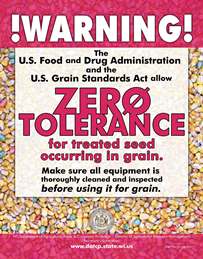Release Date: September 4, 2019
Contact: Donna Gilson, (608) 224-5130
Download PDF
Editors please note: A jpg of the warning sign shown below is available on our Flickr site.
 MADISON – If you planted treated seed last spring and plan to use any of the same equipment during harvest, remember to clean that equipment thoroughly first, agriculture officials caution.
MADISON – If you planted treated seed last spring and plan to use any of the same equipment during harvest, remember to clean that equipment thoroughly first, agriculture officials caution.
Seeds treated with insecticides and fungicides are commonly used by farmers to protect seedlings at planting. These seeds are dyed bright colors to differentiate them from untreated seeds. If even a few grains of the seed show up in a truckload or storage bin, the entire lot is considered contaminated and cannot be used in food for humans or animals.
"Federal law has zero tolerance for treated seed in harvested grain," said Lori Bowman, director of the Agrichemical Management Bureau in the Wisconsin Department of Agriculture, Trade and Consumer Protection (DATCP). "The product is considered adulterated for both human food and animal feed.”
At one Wisconsin elevator in recent years, an entire bin of grain was condemned because an employee saw a small quantity of colored seed pass from a farmer's truck into the bin. The farmer who introduced the contaminant was responsible for the cost of the condemned grain. In some cases, farmers could also face civil forfeitures in court.
Greg Helmbrecht, DATCP's seed specialist, offers this advice to farmers who plant treated seed:
- Before hauling harvested grains or forage, use a pressure washer to clean all equipment used for treated seed, including gravity boxes, truck beds and wagons. Then visually inspect it, looking for any of the brightly colored seeds.
- If you are borrowing equipment for harvest, ask the owner what was stored or hauled in it previously. Check it over carefully yourself and clean if you have any doubts.
- Check with your supplier about returning or disposing of any unused treated seed. If you are going to store it, keep it separately from grain, forage and feed storage areas. Secure it so that birds and other animals cannot get into it.
###
Find more DATCP news in our newsroom, and on Facebook, Twitter and Instagram.